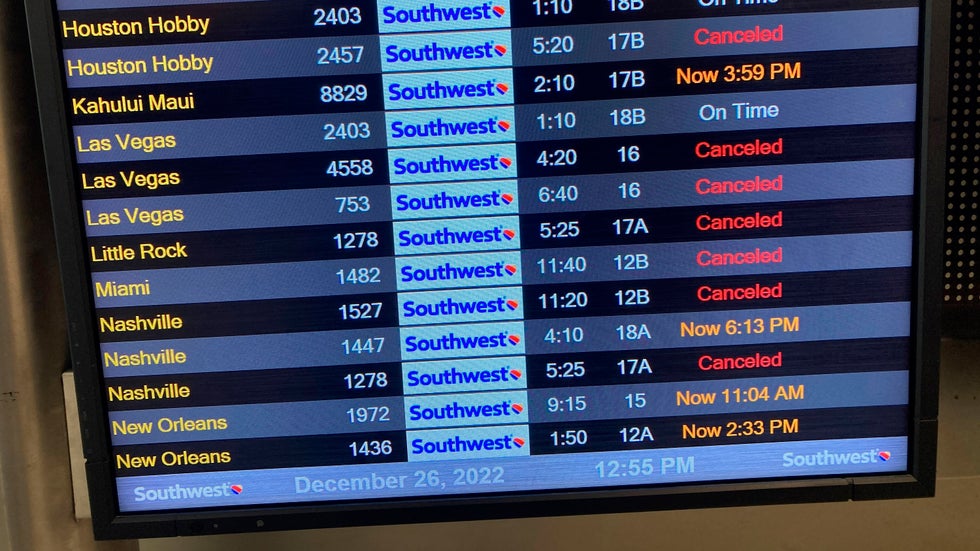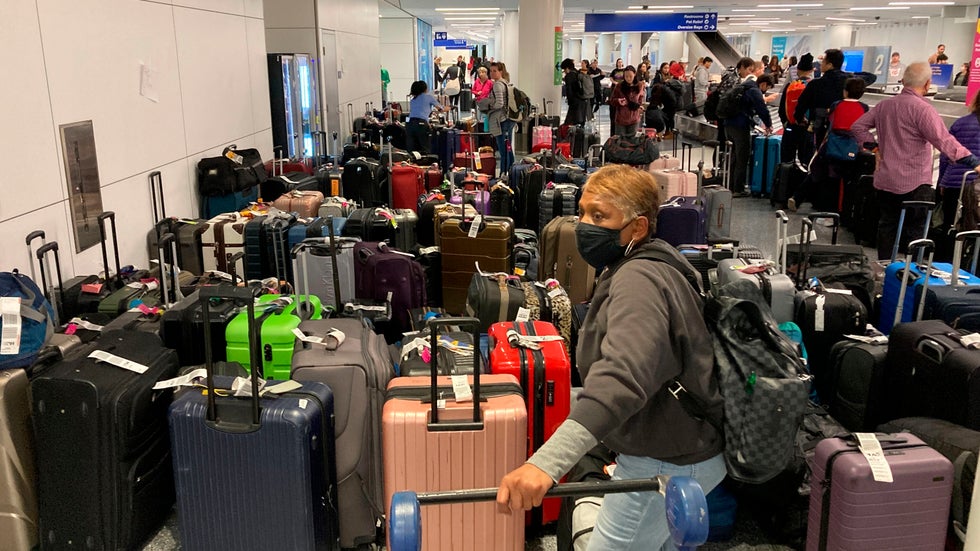Jan Wesner Childs and Dina Knightly
Southwest Airlines has canceled more than 2,500 flights today and more than 2,300 tomorrow, continuing days of flight woes that are drawing anger from passengers and scrutiny from the federal government.
The airline canceled 2,600 flights Tuesday, blaming backups from last week's bad weather.
The U.S. Department of Transportation says the rate of cancellations is unacceptable and plans to look into the issue.
Today's Southwest cancellations account for 62% of the airline's scheduled flights, according to according to airline tracker FlightAware. Tuesday's Southwest cancellations accounted for 64% of the airline's scheduled flights. Monday, Southwest canceled nearly 4,000 flights, or 71% of those scheduled.
Last week, several airlines canceled or delayed what added up to thousands of flights due to weather, including snow, wind and blistering cold from Winter Storm Elliott. Major cities including New York, Chicago and Denver were affected during one of the busiest travel times of the year.
But none have had as many problems as Southwest.
The DOT tweeted late Monday night that it is "concerned by Southwest’s unacceptable rate of cancellations and delays and reports of lack of prompt customer service." The agency says it will look into the issue.
Southwest spokesman Jay McVay said at a press conference in Houston that cancellations mounted as bad weather moved across the country, leaving flight crews and planes scattered at different airports.
“So we’ve been chasing our tails, trying to catch up and get back to normal safely, which is our number one priority as quickly as we could,” McVay said, according to The Associated Press. "And that’s exactly how we ended up where we are today.”
 A flight board shows canceled flights at the Southwest Airlines terminal at Los Angeles International Airport, Monday, Dec. 26, 2022, in Los Angeles.
A flight board shows canceled flights at the Southwest Airlines terminal at Los Angeles International Airport, Monday, Dec. 26, 2022, in Los Angeles.The airline is waiving change fees at dozens of airports through Jan. 2, with exact days varying by location. But travelers say they're encountering difficulties rebooking.
In a video shared to Twitter from inside Phoenix Sky Harbor Airport, an intercom is heard announcing that passengers will not be able to get a flight out for at least four days.
Ahead of Winter Storm Elliott last week, both air and road travelers were advised to remain flexible and have a backup plan. That's good advice for any time of the year.
Here's a look at some important things to know and travel tips during the holiday season.
More than 112 million people were expected to travel at least 50 miles from home from the day before Christmas Eve through Jan. 2, according to AAA. Most of them were expected to drive. AAA estimates this holiday season will be the third busiest for travel overall since the auto club began tracking numbers in 2000.
Most states post road closures, conditions and other travel updates online, either via the 511 system or highway safety departments. Social media pages of county sheriff's offices and emergency management are also good resources.
Always have an emergency kit in your vehicle and know where you are on the road.
The busiest pre-Christmas travel day at airports nationwide was expected to be Thursday, according to the Transportation Safety Administration. Numbers were expected to be at or near pre-pandemic levels.
Southwest waived change fees last week for flights to and from more than 60 airports across the U.S. Dates varied by location and ranged from Dec. 20 through Dec. 26. Major cities impacted include Seattle, Denver, Chicago, Indianapolis, Baltimore, Boston and New York.
Delta Airlines did the same at many of the same locations, affecting about three dozen airports. Dates also varied by location.
Other airlines, like United, no longer charge change fees on most flights but advised passengers to consider adjusting their itineraries and to be prepared for flight delays and cancellations.
 Baggage waits to be claimed after canceled flights at the Southwest Airlines terminal at Los Angeles International Airport on Monday, Dec. 26, 2022, in Los Angeles.
Baggage waits to be claimed after canceled flights at the Southwest Airlines terminal at Los Angeles International Airport on Monday, Dec. 26, 2022, in Los Angeles.Keep important things like medications and phone chargers with you and not packed while flying. That way if your luggage doesn't make it, you have the most important things.
Be aware if you have airport connections and which cities they are in. The same stands for travel by road. Be sure the check the forecast and conditions often and along your entire route.
Try to take an early flight or the first one out. Usually, that aircraft is at the airport and ready to go, not getting stuck in other cities.
Layer clothing, especially if you are traveling from a warm city to a cold city or vice versa via plane. It's also more comfortable for car rides.
The Weather Company’s primary journalistic mission is to report on breaking weather news, the environment and the importance of science to our lives. This story does not necessarily represent the position of our parent company, IBM.
The Weather Company’s primary journalistic mission is to report on breaking weather news, the environment and the importance of science to our lives. This story does not necessarily represent the position of our parent company, IBM.

No comments:
Post a Comment